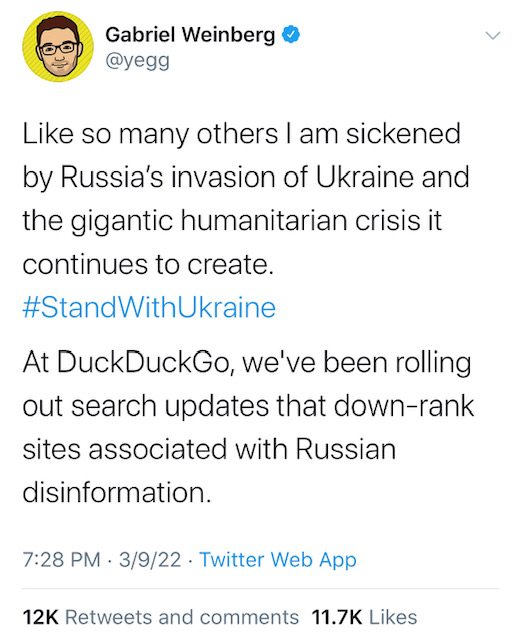To Begin Censoring "Disinformation"

DuckDuckGo, the search engine, has grown in popularity in recent years and owes much of its success to its emphasis on protecting the searchers privacy and avoiding curated search results. In today's Google dominated internet based service offerings, competitors, especially in the search engine space need a superior offering that resonates with users just to gain a market share foothold. For DuckDuckGo that competitive advantage was trust. Something Google has not been able to offer its user-base since they removed the "Don't Be Evil" clause from its code of conduct.
Unfortunately for loyal users of the service, myself included, that trust was recently undermined by the founder and CEO of the company, Gabriel Weinberg when he announced via Tweet that the search engine would be rolling out search updates that would down-rank sites associated with Russian disinformation.

For the userbase of this service, that being individuals who value privacy and unbiased search results, this move has effectively compromised the service. Now I am not going to pontificate on why Weinberg decided to crack down on "disinformation" for this particular topic, but we all know the old addage,The first casualty of war is always the truth.
So from now on if you use DuckDuckGo as a search engine Weinberg will be filtering your results through his version of The Ministry of Truth.
The Deeper Problem
As a daily user of the service I view this move as a serious wakeup call that points to a much deeper problem, reliance on proprietary software. It is looking more and more like Richard Stallman was right all along when he said that proprietary software was malware.
If you have never looked into the free software movement, it can best be understood by watching Stallman's TEDx video: "Introduction to Free Software and the Liberation of Cyberspace. The central idea behind the movement is that by making software free (think libre or freedom) it gives the user control over the software. Proprietary software does just the opposite, it gives the software control over the user.
In a world where companies have forgotten the lessons learned from Orwell's Nineteen Eighty-Four dystopian science fiction novel this concept is key to ensuring the free flow of ideas and speech. Take for example, the case study that was Parler, the social media app that bills itself as unbiased social media
and a place where you can speak freely and express yourself openly without fear of being 'deplatformed' for your views.
Parler grew rapidly following the last round of presidential elections when Facebook and Twitter stepped up their efforts to crack down on misinformation. What happened next was a coordinated attack on Parler by Apple, Amazon, and Google that effectively booted parler off of the internet within a span of less than twenty-four hours. Both Google and Apple kicked the application off of their devices respective app store, and Amazon removed the social media company from its cloud hosting services, Amazon Web Services. This left the service inaccessible until the company bowed to the wishes of the powers that be.
Both Parler and DuckDuckGo illustrate the problems with centralized control when it comes to internet services. In the case of Parler, the service was targeted and held hostage until they agreed to comply with the wills of larger tech companies. In DuckDuckGo's case the founder and CEO woke up one day and decided to start censoring search results which undermines user trust and begs the question of what else they might be censoring. In either case the users, you and I, lose.
The Solution
So instead of being herded onto the next platform that promises to put the user first let us learn from recent history and avoid the trappings that come with centralized control on the internet.
Free software puts control of the software back into the hands of the user, you and I. If software is free and decentralized, it can be installed by anyone and run on any server. With similar forms of censorship happening more and more frequently and in a world where the International Monetary Fund (IMF) is proposing linking your web browser history to your credit score it is best we get ahead of this problem and lead by example by adopting these existing software options that empower the user. Who knows, if the IMF gets their Orwellian wish this proactive step could be good financial advice!
Now, as for search engines, dump DuckDuckGo and...
Use SearX!

SearX is a decentralized meta-search engine which runs on free and open source software (FOSS). It polls results from whatever search engines you have selected and it aggregates the results. Because it is FOSS it can be installed by anyone and run on any server.
You can read more about it on their website, find an instance to use, or install it on your server. I was first made aware of this search engine by Luke Smith, check out his overview video of SearX on PeerTube or Odysee.
If you found this article interesting and would like to share a comment with me, please feel free to reach out to me directly via my personal email at (drew@drewredifer.com).
Return to